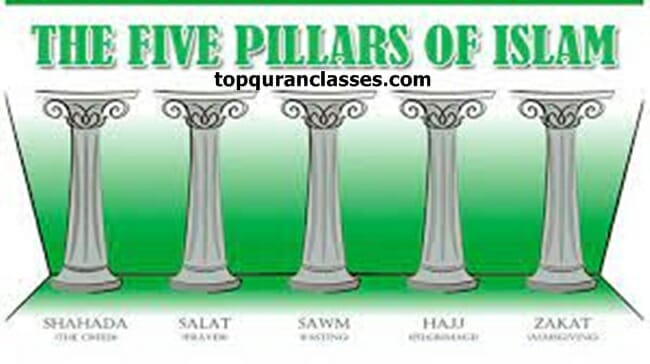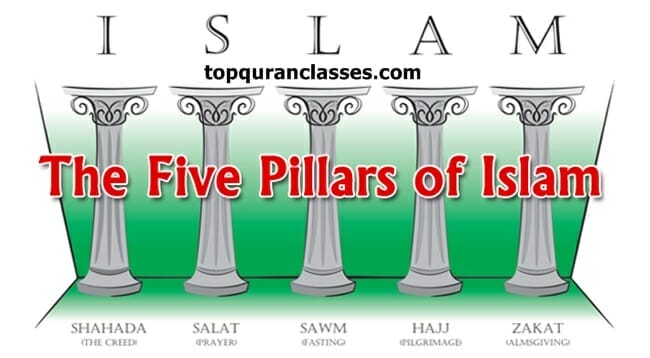What are the pillars of Islam? Islam has five pillars that cannot be established without them, and a person’s Islam is not valid unless he submits to these five pillars, and the explanation of these five pillars came in the hadith of Ibn Omar – may Allah be pleased with him – where he said: I heard the Messenger of Allah, peace be upon him, say: Islam is built on five, Testifying that there is no god but Allah and that Muhammad is His servant and Messenger, establishing prayer, giving zakat, pilgrimage to the House, and fasting Ramadan.
Read more: Native Quran teacher
The five pillars of Islam
The five pillars of Islam are :
- Testimony that there is no god but Allah and that Muhammad is the Messenger of Allah.
- Establishing prayer.
- Paying the zakat.
- Fasting of Ramadan.
- Pilgrimage to the House of those who were able to way.
What are the pillars of Islam?
In the following lines, we will mention the pillars of Islam:
Shahada (testimony that there is no god but Allah and that Muhammad is the Messenger of Allah)
- Martyrdom is the first and most important of the pillars, as it is the key by which a person enters the circle of Islam.
- As for the first part of it, “There is no god but Allah,” it means that a person speaks with his tongue.
- At the same time, he acknowledges in his heart that there is no deity worthy of worship but Allah, and upon Him, the Muslim relies.
- The testimony also requires that a person believes that there is no creator of this universe but Allah alone without a partner, and there is no second or third deity to be worshiped with him.
- As for the testimony that Muhammad is the Messenger of Allah, it means that you believe that the Prophet is sent as a mercy to the world.
- It is a herald of good tidings and a warning to all of creation, and it believes that its law abrogates the religions that preceded it.
- It also requires that a person takes from the teachings of the Prophet Muhammad.
- May Allah bless him and grant him peace, what he commanded to be taken, and abstain from what he forbade.
The prayer
- And prayer is considered to be the link between the servant and his Lord.
- It has a great place in Islam.
- Islam considers prayer to be the first thing that a person will be held accountable for on the Day of Resurrection.
- Likewise, it is the distinguishing mark between a Muslim and an infidel.
- This is evidenced by what came in the hadith of Jaber, may Allah be pleased with him, that the Prophet, may Allah’s prayers and peace be upon him, said: “Between a man and polytheism and infidelity is leaving prayer” (Narrated by Muslim).
- The Muslims have imposed five daily prayers (Fajr, Dhuhr, Asr, Maghrib, and Isha) and others are voluntary.
- Every Muslim must perform his prayers at their appointed time and in the manner that the Messenger, may Allah bless him and grant him peace, taught us.

Zakat (giving zakat)
- Giving zakat is financial worship that Allah Almighty imposed on His servants, to purify their souls from miserliness and their sheets of sins.
- And Allah Almighty has said in his book: “Take from their wealth a charity that purifies them and purifies them with it” (al-Tawbah: 103).
- And Allah has imposed on Muslims two zakat, Zakat al-Fitr, which is paid after the month of Ramadan.
- And Zakat on money, which is 2.5% of the money saved annually and over which one year.
- Has passed (that is, the money is owed for a whole year without changing its amount).
- Zakat is paid to the needy poor and this obligation is dropped from the destitute people who have nothing.
- Islam did not leave the Muslims the freedom to dispose of this deducted amount.
- But rather specified it in eight paths, one of which a Muslim can choose to spend zakat.
Read more: How to Prepare for Ramadan 2021
Fasting (fasting of Ramadan)
- As for fasting, it is fasting the month of Ramadan.
- Ramadan is considered a great season in which acts of worship abound.
- It is a blessed month in which mercy descends, and the servant renews his covenant with Allah and draws closer to Him through acts of worship.
- Fasting in Ramadan has several virtues.
- Allah Almighty has guaranteed for those who fasted it out of faith and in anticipation of forgiveness for their past sins and other virtues.
- A reward for those who fasted it out of faith in Allah and in anticipation of the reward.
- And the Muslim fasts from food and drink and abstains from idle talk, gossip, marital intercourse, and every bad deed from sunrise (that is, from the dawn prayer) to its sunset (the sunset prayer).
- He spends all his day in worship, remembrance, recitation of the Quran, and science lessons that give him a supply of faith that suffices him for the rest of the year.
- This imposition is waived for someone unable to fast.
- Such as a disease that compels him to take medicine or a stomach ulcer patient who is unable to cope with an empty stomach from eating and drinking.
Hajj (Pilgrimage to the House for those who can do so)
- The pilgrimage is to visit the Grand Mosque in Mecca and perform the Hajj.
- Allah has made this obligation upon every adult Muslim who can bear the costs of Hajj.
- Allah Almighty says: “And to Allah is the pilgrimage of the House for the people, whoever can make a way to it” (Al Imran: 97).
- Allah has imposed Hajj to purify souls, and to educate them on the meanings of servitude, obedience, and patience.
- In addition, it is a great opportunity to expiate sins.
- It came in the hadith: “He who performs Hajj to this House and does not obscene or immoral, returns as the day his mother gave birth to him” (Bukhari and Muslim).
Read more: What are Top Quran Classes
What is common to the pillars of Islam?
- The pillars of Islam have in common that performing them is one of the signs of faith.
- They are acts of worship in which devotion is required to Allah Almighty alone, who has no partner.
What is the difference between the pillars of Islam and the pillars of faith?
- We mentioned in our topic the pillars of Islam, as for the six pillars of faith, which are: Belief in Allah and His Angels, His Books, His Messengers.
- The Last Day, and belief in predestination, both good and evil.
- The difference between both the pillars of Islam.
- The pillars of faith are that the pillars of Islam are visible actions that the limbs perform, such as prayer, zakat, fasting, and Hajj.
- As for the pillars of faith: they are inward actions whose place is in the heart, such as belief in Allah.
- His angels, His books, His messengers, the Last Day, and belief in predestination, both good and evil.
- And Allah mentioned in his dear book that he is a Muslim and not a believer.
- The Almighty said: [The Bedouins said, “We believe.” Say, “You have not believed.” But say, “We have submitted.”
Do you want your kids to learn more about Online Quran Classes? Sign up for Top Quran Classes in the Islamic academy online with the Online Quran Classes program and watch them dive deeper into the Quran science and learn the Holy Book of Allah.
Top Quran Classes are online Quran classes for kids, Islamic studies for kids, and let your children learn the accurate Quran recitation and word pronunciation even if Arabic is not their first language.
Quran lessons online in Top Quran Classes are fun as well as structured, they’ll learn with eLearning Quran;
Our Quran teacher, Arabic teacher, Islamic Studies teacher, and tajweed teacher, ( Quran for kids ) will be their friends during this amazing journey.
Online Quran tuition learning can be challenging if you’re seeking it for your kids.
Top Quran Classes offers you a wide variety of topics to teach your children online.
Top Quran Classes experienced live tutor ( male Quran teacher & online female Quran tutor ). They have many years of experience in Teaching Arabic online and the Quran online to non-Arabic speakers.
Whether it’s Quran online, Arabic online, Tajweed, Ijazah, tafsir, Qirat, tajwid al Quran, and Islamic Studies. Top Quran Classes has your back with professional Quran tutors who are willing to go further with your kids’ education. With an attractive interface and well-structured lessons,

